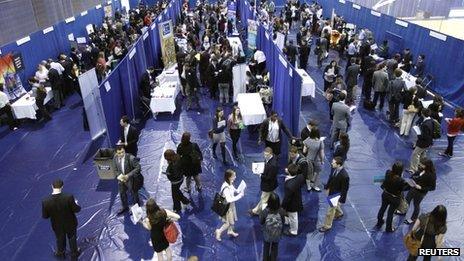Job advantage for graduates with work experience - survey
- Published

Graduates are carrying out more work experience and applying for more jobs
Graduates who had internships or work experience when they were students are much more successful in job hunting after university, research suggests.
The High Fliers study of more than 18,000 university leavers indicates that graduates who have had internships are three times as likely to land jobs.
Marketing is the most popular sector for these first jobs and more students than ever plan to work in London.
Fewer students are taking time off after studies to travel.
This picture of the graduate jobs market is based on face-to-face interviews with students leaving 30 leading universities across the UK, carried out by High Fliers Research, which produces data on graduate recruitment.
Record applications
The study shows an increasingly intense job hunt, with applications at record levels, applications being sent earlier and a rising expectation that students will already have relevant work experience.
More than one in three students had carried out work experience or internships with a prospective employer - and in some universities, with Bath the highest, this was above three-quarters.
"Work experience is no longer an optional extra for university students, it's an essential part of preparing for the graduate job market," said Martin Birchall, managing director of the research firm.
Before they leave university, students will have submitted an average of more than seven job applications each, the highest level found in 18 years of research into the graduate jobs market.
It also means that employers face a deluge of applications for graduate entry jobs.
Researchers estimate that from these 30 universities alone there will have been 427,000 job applications generated this year - almost double the number from five years ago.
The highest number of job applications in this survey was from students at the London School of Economics, who sent an average of more than 11. These students were also at the top of the table for those who have already received job offers.
This latest wave of graduates are less likely to take time off after university than in previous years. Only about one in 10 is considering going travelling or doing other activities rather than immediately entering work or postgraduate study.
These students will not have been affected by the increase in tuition fees to up to £9,000 per year. But the study shows the wide range of different levels of debt on graduating. The three highest levels of debt from this group of universities are all in London and above £26,000 - Imperial College, University College London and the London School of Economics.
The three lowest levels of debt are all in Scotland - where there are no tuition fees - in Edinburgh, Glasgow and lowest of all in Strathclyde, where average debt is £8,400.
The lowest level of debt on graduation in England is Bristol at £18,900.
The destination for these young job hunters is more likely than ever to be London, showing how much the capital has become a magnet.
Half of all graduates now expect to work in London, with the capital the most popular location for students leaving 27 out of 30 universities. The only exceptions are Queen's University in Belfast and Strathclyde and Glasgow universities.
While 50% of students across the UK plan to work in London and 21% plan to work overseas, only 1% plan to work in Wales, 2% plan to work in the north-east of England and 4% plan to work in the Midlands.
Weighing up options
The most extreme expectation of heading south was in Durham, where only 3% of former students expected to work in the region where they attended university. Only 17% of students in Birmingham expect to stay to work there. In London, up to 75% of students plan to work in the capital.
The most popular job sector for these university leavers is marketing, with the single most popular type of job aspiration being to work in an advertising or PR agency.
The study found increasing levels of interest in engineering and law and falling levels of interest in graduate jobs with the police, retail, teaching and property.
Mr Birchall highlighted how much job hunting had become part of student life.
"Students who just focus on their degree studies without spending time in the workplace are unlikely to develop the skills and interests that graduate employers are looking for.
"The survey also shows just how hard today's university students are working to secure a graduate job at the end of their degree. Record numbers of students are now choosing to research their career options in their first or second year at university, rather than leaving job hunting until the final six months before graduation."
- Published24 April 2013
- Published20 May 2013
- Published11 October 2012